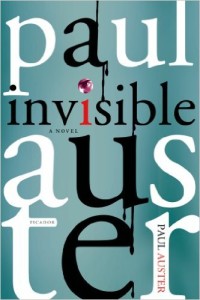The Novels of Paul Auster
12/7/2015 — Reading and Appreciating Paul Auster
 I’ve become a big fan of the American writer Paul Auster—and not just because his first novella, City of Glass, was rejected by seventeen publishers before finding a home and launching a prolific, thirty-year literary career (and yes, that means I’m a bit late in joining his fan club). I read the New York Trilogy (which includes City of Glass) last year and loved it, but it was only last month that circumstances led to me to pick up another Auster novel, Invisible (2009), which I found even more fascinating.
I’ve become a big fan of the American writer Paul Auster—and not just because his first novella, City of Glass, was rejected by seventeen publishers before finding a home and launching a prolific, thirty-year literary career (and yes, that means I’m a bit late in joining his fan club). I read the New York Trilogy (which includes City of Glass) last year and loved it, but it was only last month that circumstances led to me to pick up another Auster novel, Invisible (2009), which I found even more fascinating.
Auster’s novels often include certain themes and patterns: they contain a good deal of autobiography, often made obvious when main characters are writers who either bear Auster’s own name or have the same initials, a frequent use of coincidence, a missing father, a sense of imminent disaster, and perhaps most important, an ambiguity about the story and the novel it appears in. This often takes the form of a book within the book, with the reader not discovering this until midway through the reading, or even later.
Invisible, for example, begins in 1967, with the first-person account of 20-year-old Adam Walker, who was born in February 1947, the same month as Auster, and who is attending Columbia University, as did Auster, and who spends time in Paris working as a translator and struggling poet, as did Auster.
 But while Auster may have a penchant for including real-life touchstones in his work, his writing is fiction at its best. Invisible is a coming-of-age story about life and love, told through a series of interlocking love affairs. The prose is fluid, lean, and unpretentious, and it’s easy to read it too quickly, which is partly why I think Auster throws in the surprises that force a reader to stop, reconsider, and question everything that may have previously seemed clear. (Reader warning: The rest of this review includes spoilers.)
But while Auster may have a penchant for including real-life touchstones in his work, his writing is fiction at its best. Invisible is a coming-of-age story about life and love, told through a series of interlocking love affairs. The prose is fluid, lean, and unpretentious, and it’s easy to read it too quickly, which is partly why I think Auster throws in the surprises that force a reader to stop, reconsider, and question everything that may have previously seemed clear. (Reader warning: The rest of this review includes spoilers.)
Invisible moves along briskly until page 65, when an unexpected act of violence stops the reader—and Walker—cold. And then on page 75, in part II of the novel, we learn that what we’ve read so far is actually the first part of a memoir written forty years later by Walker, who is dying of cancer. He’s sent the manuscript to an old college chum, Jim Freeman, also an author, to find out if it has any merits. A meeting is set but not for several weeks, and because time is literally short, Freeman urges Walker to keep going. While Walker is the narrator of the first part, his writer friend is the narrator of the second.
The next section of the memoir is the heart of the novel. It’s the telling, in beautiful but disturbing passages, of a passionate, month-long affair between Walker and his older sister, leading up to Adam’s scheduled departure for Paris. This section is told in the second person, with Walker talking in a sense to himself, a fascinating device that allows some distance, as though the subject matter is too personal, too difficult, for the pronoun “I.”
There is a clean break ending the incestuous affair, helped by Walker’s move to Paris. He knows that the physical relationship can never be reignited or even spoken about (it’s invisible like everything in life that truly matters), but still Walker is unable to get over it. In Paris, he becomes involved with two other women. Neither affair ends well, and Adam ends up returning abruptly to New York under shady circumstance.
After Walker’s death in the last section of the novel, Freeman is left to decide what to do with the manuscript. He decides to add his own comments to the memoir and publish it as a work of fiction, in a volume that presumably would look much like Invisible looks to the reader. Before he does that, however, he shows it to Walker’s sister, who verifies several key points, but denies that there was ever an incestuous affair. Freeman doesn’t know whether to believe her or Walker’s manuscript, and neither does the reader. And of course that makes the whole story questionable, with the reader left to draw his or her own conclusions. This is Auster’s trademark.
I found the use of the different first-person points of view—and especially the second-person section—quite interesting, as both a reader and a writer. In an interview with the The Paris Review a few years ago, Auster talked a little about why he likes to experiment with different approaches, preferring to avoid the common third-person point of view:
“The third-person narrative voice in the traditional novel is a strange device. We’re used to it now, we accept it, we don’t question it anymore. But when you stop and think about it, there’s an eerie, disembodied quality to that voice. It seems to come from nowhere and I found that disturbing. I was always drawn to books that doubled back on themselves, that brought you into the world of the book, even as the book was taking you into the world.”
Though Invisible and many of Auster’s other works have won critical acclaim and a host of awards, he’s not without his critics, most notably the respected James Wood, who wrote a scathing article in the Nov. 30, 2009 issue of The New Yorker:
“What Auster often gets. . .is the worst of both worlds: fake realism and shallow skepticism. The two weaknesses are related. Auster is a compelling storyteller, but his stories are assertions rather than persuasions. They declare themselves; they hound the next revelation. Because nothing is persuasively assembled, the inevitable postmodern disassembly leaves one largely untouched. (The disassembly is also grindingly explicit, spelled out in billboard-size type.) Presence fails to turn into significant absence, because presence was not present enough.”
That’s a minority view, as Wood acknowledges, but not one you should necessarily ignore. I guess you’ll just have to read the novel and draw your own conclusions.
Mark Willen
Mark Willen’s novels, Hawke’s Point, Hawke’s Return, and Hawke’s Discovery, were released by Pen-L Publishing. His short stories have appeared in Corner Club Press, The Rusty Nail. and The Boiler Review. Mark is currently working on his second novel, a thriller set in a fictional town in central Maryland. Mark also writes a blog on practical, everyday ethics, Talking Ethics.com.
- Web |
- More Posts(48)